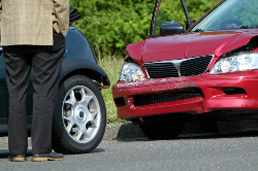Auto Insurance Tips |
| The Right Coverage, The Right Car, Rental Cars and Accident Reporting |
What To Do After an Accident
If you have been in an accident, here are some general guidelines about what to do:
- Never leave the scene of an accident, even a minor one.
- Call the police and seek medical assistance if necessary.
- Do not admit fault. Do not comment about the accident to anyone except your insurance representative and the police. Never accept or make an offer of cash, check or a so-called "private" settlement.
- Gather accident information. Note the date and time of accident.
- Obtain information on the other driver including their name, address, phone number, make of car, vehicle license number, insurance company and their agent's name and phone number.
- Record a description of what occurred, including a diagram of the accident showing the direction of both cars and the point of the accident. Include street names and location of traffic signs/signals.
- Report the accident promptly to your insurance agent.
New Car Selection: Safety Counts
The Insurance Institute for Highway Safety has published a shopping guide for those wanting to buy a new car based upon safety features. While the guide does provide specific car lists (from station wagons to sports cars) it also reveals some overall safety basics to keep in mind.
Wear Your Seat Belt - The more comfortable your safety belt is, the more likely you are to use it whenever you are in the car. Shoulder belts allow some forward movement, but automatic crash tensioners and belt webbing grabbers can reduce the chance of an occupant hitting the steering wheel or dashboard in a serious crash.
Air Bags - Air bags serve as a buffer between the inside of your car or truck and the heads and faces of its occupants. Air bags provide automatic protection crashes from the front. The Insurance Institute for Highway Safety notes that while the speed and force of air bag inflation may occasionally cause minor injuries such as abrasions, "this slight risk is far outweighed by the benefits." These types of injuries can be reduced by adjusting your seat so it is not too close to the steering wheel.
Head Restraints are required in the front seat of all new passenger vehicles. Properly adjusted head restraints prevent a driver's or passenger's head from snapping backwards in a rear-end collision. Look for adjustable head restraints that are designed to protect both tall and short people (even in the "down" position). And avoid poorly-designed adjustable restraints that only protect the shortest occupants.
Built-in Child Seats - Several cars and vans offer built-in child safety seats as options.
Anti-Lock Brakes are designed to avoid skidding and loss of control. Anti-lock brakes automatically pump several times a second. A driver needs to become familiar with the difference in braking style since anti-lock brakes often require heavy braking pressure to activate this safety feature.
Update Your Policy To Reflect Changing Needs
The state requires that drivers have automobile insurance. However, it is important to have more coverage than the minimum mandated by law in order to properly protect yourself. Make sure that the liability limits in your policy are high enough and that the deductible amounts are acceptable to you.
For more information, contact Insurance Management Associates at 410-266-8888 or by e-mail.
|

Quick Tips
Lowering Your Premiums
Insurance premiums are determined by a number of factors, including:
- Driving Record - If you and your family have a clean driving record with no moving violations or claims within past 3 years.
- Repair Cost - Premiums are based on what it is going to cost to repair the car. So a more expensive car will have a higher premium.
- Good Student - Discounts may apply if a student has GPA of 3.0 or higher.
- Bad Driving Record - The highest premiums are for drivers with bad driving records.
- Less Experience - New drivers are subject to higher premiums because of their limited driving experience.
- Other Discounts - Some insurers offer discounts for things like no accidents in three years, drivers over 65 years of age, driver training courses, anti-theft devices, and having more than one car insured with that company.
- One Carrier - You may qualify for an auto/home credit if you have both policies with one insurance carrier. Many companies offer discounts to motorists who also have both their homeowners' and auto policies with them.
To find out what we can do for you, contact Insurance Management Associates at 410-266-8888 or by e-mail.
More Money-Saving Tips
- Before you buy a new or used car, check into insurance costs. Cars that are expensive to repair, or that are favorite targets for thieves, have much higher insurance costs.
- Consider Higher Deductibles - Your deductible is the money you pay before making a claim. By requesting higher deductibles on collision and comprehensive (fire and theft) coverage, you can quite often lower your premiums substantially.
- Are Collision and Comprehensive Coverage Necessary On Older Cars? It may not be cost-effective to have collision coverage on cars over ten years old, because a claim you make would not substantially exceed annual cost and deductible amounts.
To find out what we can do for you, contact Insurance Management Associates at 410-266-8888 or by e-mail.
|

